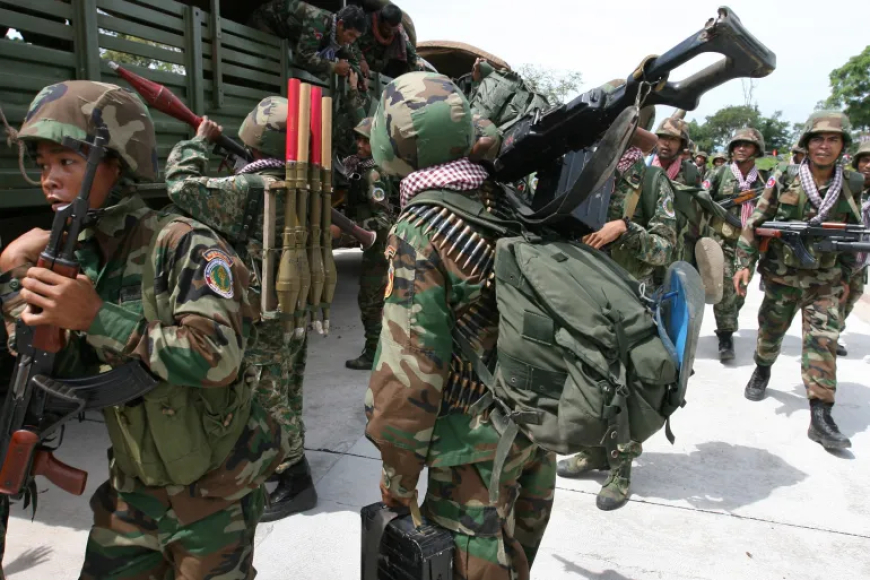Armed Clashes Escalate at Thailand-Cambodia Border: Civilians Flee, Diplomats Withdraw
An in-depth report on the July 2025 military escalation between Thailand and Cambodia, detailing casualties, diplomatic fallout, economic consequences, and implications for regional stability.

Armed Clashes Escalate at Thailand-Cambodia Border: Civilians Flee, Diplomats Withdraw
Bangkok/Phnom Penh, July 25, 2025 — Tensions between Thailand and Cambodia have erupted into some of the most serious armed clashes seen in Southeast Asia in over a decade. At least 11 civilians and one Thai soldier are confirmed dead following a series of cross-border skirmishes that began earlier this week near the long-disputed Ta Muen Thom temple area.
Thousands of civilians have been displaced, with both countries closing key border crossings and withdrawing diplomatic staff. The conflict, sparked by a series of provocations earlier this year, has now escalated into a direct military confrontation involving artillery, airstrikes, and aggressive political rhetoric from both governments.
Clashes Intensify Near Historic Border Temples
The latest violence centers around a rugged region near the ancient Ta Muen Thom temple, a 12th-century Khmer structure located on the border of Thailand's Surin Province and Cambodia's Oddar Meanchey Province. Disputed for decades, this territory has once again become a flashpoint after Thai and Cambodian forces exchanged heavy artillery fire beginning on July 22.
Thailand has since confirmed that F‑16 fighter jets were deployed, targeting Cambodian military outposts allegedly responsible for the shelling of Thai border villages. Cambodia responded with rocket artillery and mortar fire, leading to extensive damage across civilian zones and agricultural land.
Civilian Toll Rises, Mass Evacuations Underway
The humanitarian impact is already substantial. According to the Thai Ministry of Interior, over 40,000 civilians have been evacuated from more than 80 border villages in Surin and Si Sa Ket provinces. Casualty reports confirm at least 11 Thai civilians killed, including three children, and dozens more injured by falling debris and shrapnel.
Cambodian authorities have not released official civilian casualty numbers but confirmed several military personnel were injured during retaliatory strikes. Local hospitals on both sides of the border are reportedly overwhelmed.
“We were caught completely off guard. We heard bombs in the distance and then within minutes, everything went dark,” said Somchai Watanakul, a farmer evacuated from the Thai side near the border. “It feels like war.”
Diplomatic Ties Collapse Amid Rising Nationalism
The military confrontation has now spilled into diplomatic channels. On July 23, Thailand formally recalled its ambassador to Phnom Penh, and announced it would expel Cambodia’s envoy by the end of the week. Cambodia retaliated by withdrawing all of its diplomatic personnel from Thailand and suspending bilateral cooperation.
Both nations have issued statements blaming each other for the escalation. Thai Prime Minister Anupong Chatchai accused Cambodia of "repeated violations of national sovereignty," while Cambodian Prime Minister Hun Ratha condemned Thailand’s "unprovoked aggression" and "airspace violations."
The two countries had previously attempted de-escalation talks in mid-June, but these efforts stalled after a Thai border patrol was severely injured by a landmine near the disputed zone.
Border Closures and Economic Fallout
Thailand has announced the complete closure of border crossings with Cambodia in the conflict-affected provinces. Cross-border trade, which totals billions annually, has now come to a halt. Cambodian exports of rice, garments, and textiles have been disrupted, while Thai businesses reliant on Cambodian labor and raw materials are reporting significant delays.
The Cambodian Ministry of Commerce stated that the border shutdown would "cripple" local economies along the frontier, and urged international mediation. Meanwhile, Thailand has suspended internet and utility access to certain Cambodian-registered infrastructure projects within disputed zones.
Tourism has also taken a hit, with several travel advisories issued by ASEAN nations and major flight routes redirected away from the conflict region.
Regional and Global Response
The growing crisis has prompted concern from regional organizations and global powers. The ASEAN Secretariat has called for an “urgent ceasefire and renewed dialogue,” while China, a close economic partner to both nations, has offered to mediate.
The United Nations Security Council is expected to convene an emergency session after Cambodia formally requested international oversight. Human rights organizations, including Amnesty International, have raised alarms over reports of landmine use and indiscriminate shelling in civilian-populated areas.
“The use of explosive weapons in populated areas must cease immediately,” said Linh Tran, Southeast Asia analyst for Human Rights Watch. “Both nations have a responsibility to protect civilian lives and infrastructure.”
Long-Brewing Tensions Come to a Head
This is not the first time the Thai-Cambodian border has turned volatile. Similar flare-ups occurred in 2008–2011, primarily around the Preah Vihear temple, another UNESCO World Heritage site. However, those confrontations were largely contained through international arbitration.
The current conflict appears more dangerous, with both governments facing domestic political pressure and nationalist sentiment. Cambodian state media has aired footage of military convoys headed to the border, while Thai news outlets have broadcast near-daily footage of injured civilians and destroyed villages.
In June 2025, Cambodia announced a ban on Thai fuel and media imports, following Thailand’s new restrictions on Cambodian access to digital infrastructure and electricity supplies. Tensions further spiked after Cambodia announced it would implement military conscription in 2026, citing “regional security threats.”
Future Outlook: Ceasefire or Prolonged Crisis?
With no ceasefire in sight, experts warn that the current standoff could become a prolonged crisis if diplomatic channels remain closed.
“This conflict is no longer just about a patch of disputed land. It’s a broader test of sovereignty, military strength, and political will,” said Dr. Surachai Pattharakul, a regional security analyst at Chulalongkorn University. “The longer this continues, the harder it will be to contain.”
While sporadic shelling continued into the early hours of July 25, Thai officials indicated that no new offensives were currently underway. Cambodian officials have appealed to the United Nations to intervene before the conflict spirals further.
Until then, the border remains a battleground, both physically and diplomatically, with tens of thousands of lives hanging in the balance.




















































